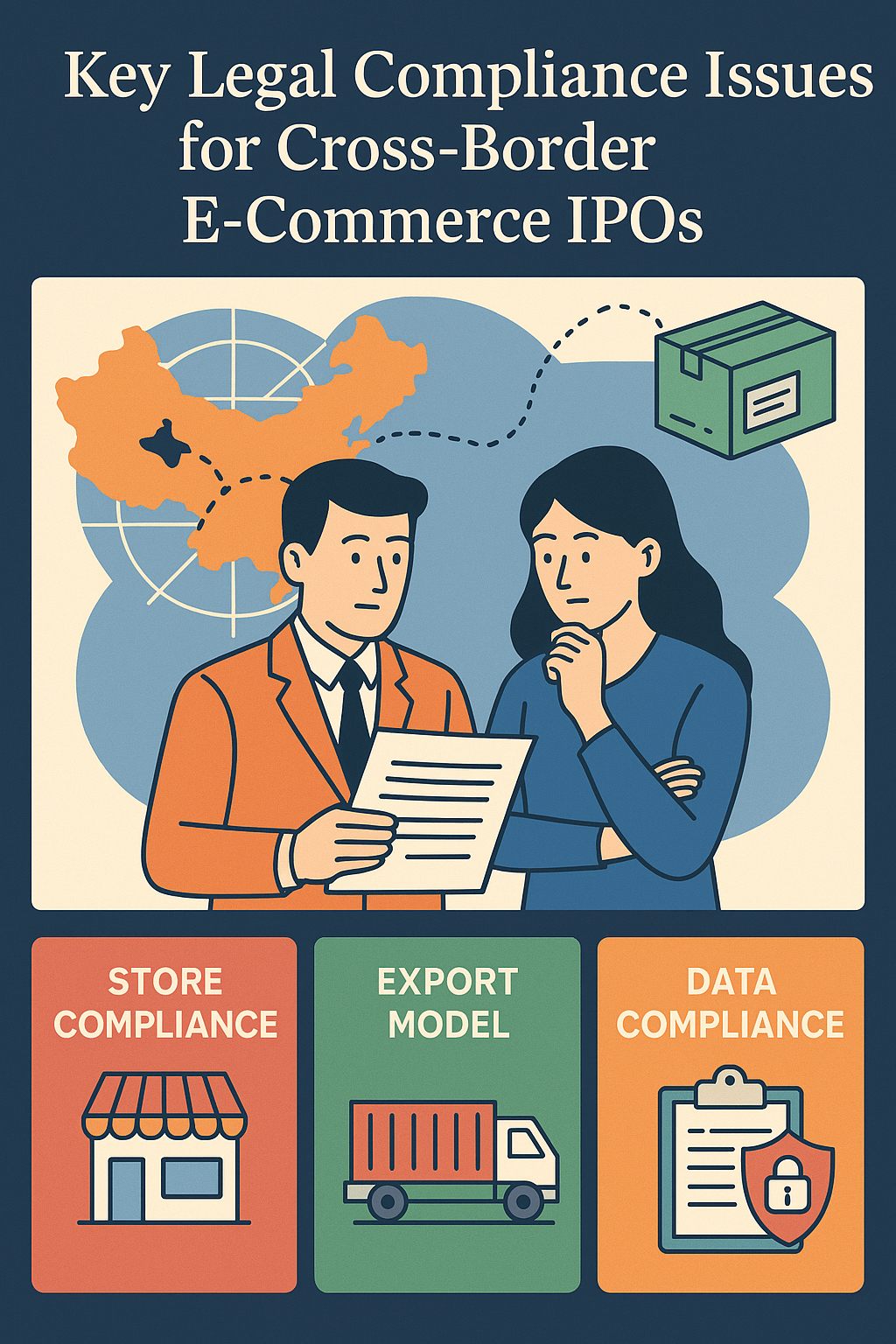View News
Key-Legal-Compliance-Issues-for-Cross-Border-E-Commerce-IPO

Key Legal Compliance Issues for Cross-Border E-Commerce IPOs
Introduction
China’s cross-border e-commerce sector is growing rapidly, with RMB2.63 trillion in trade recorded in 2024. However, new global regulations in the US and EU, including significant tariffs and parcel fees, signal a shift toward stricter governance. Amid these developments, cross-border e-commerce companies planning IPOs face mounting scrutiny over compliance—both in China and globally.
Indian companies—especially startups, aggregators, D2C exporters, or logistics providers involved in China-origin goods or managing cross-border operations—must also understand how Indian legal frameworks intersect with global compliance issues. These considerations become critical for companies planning dual listings, supply chain dependencies, or cross-border warehousing and fulfilment involving India.
1. Store Compliance
Many Chinese companies operate multiple online stores using affiliated or unrelated entities. Similar trends exist in India, where startups often register multiple seller accounts on global platforms like Amazon, eBay, or Etsy to boost visibility.
Indian Perspective:
-
Platforms like Amazon India or Flipkart also restrict multiple seller accounts under a single PAN without explicit approval. Violating this may lead to account suspension.
-
Indian IPO-bound startups must ensure their marketplace accounts and selling structures are compliant under the Information Technology (Intermediary Guidelines and Digital Media Ethics Code) Rules, 2021, and marketplace-specific terms.
-
Use of related-party seller accounts without disclosure can trigger action under the SEBI (Listing Obligations and Disclosure Requirements) Regulations, especially when preparing DRHPs (Draft Red Herring Prospectuses).
2. Export Model Compliance
China’s customs regime offers multiple trade codes tailored to business models. In India, cross-border e-commerce exports fall under E-commerce Export under Courier or Postal Mode and E-commerce Export under Air Cargo mode facilitated via ICEGATE and DGFT.
Indian Perspective:
-
Exporters must follow Foreign Trade Policy 2023, which promotes cross-border e-commerce under Chapter 9.
-
Use of INR billing for exports, customs-compliant invoice documentation, and correct HSN codes are vital for claiming RoDTEP or GST refunds.
-
Many e-commerce exporters misuse low-value parcel exemptions or misclassify exports as “gifts”, which is now being strictly policed by the CBIC and DGFT.
-
Companies exporting through Indian warehouses but using foreign logistics or supply chain partners must also comply with FEMA (Foreign Exchange Management Act) regulations and SEZ/EOU guidelines if applicable.
3. Data Compliance
Chinese regulators focus on the legal use and protection of customer data under the PRC Data Security and Cybersecurity Laws. Globally, regulations like the GDPR (EU) and CCPA (California) are becoming relevant for all cross-border operations.
Indian Perspective:
-
India enacted the Digital Personal Data Protection Act, 2023 (DPDP Act), effective from 2024, which applies to:
-
Collection and processing of personal data of individuals in India,
-
Even by foreign companies or cross-border platforms targeting Indian consumers.
-
-
E-commerce exporters collecting buyer data (emails, addresses, preferences) via their own websites or marketplaces must:
-
Obtain valid consent,
-
Maintain data protection and security frameworks,
-
Appoint Data Protection Officers in certain cases,
-
Ensure cross-border data transfer compliance (especially when using servers or CRMs hosted abroad).
-
-
Non-compliance may result in fines up to ?250 crore under the DPDP Act, and disclosure of such risk is necessary in IPO prospectuses.
Conclusion
The global regulatory landscape for cross-border e-commerce is tightening, with both China and major markets like the US, EU—and increasingly India—implementing refined governance frameworks. For IPO-bound companies, particularly those operating between China and India or exporting globally from India, a multi-jurisdictional compliance strategy is essential.
Strategic Advice for Indian Stakeholders:
-
Startups involved in drop shipping or D2C exports must ensure they are customs- and data-compliant in both outbound and inbound jurisdictions.
-
Investors should assess risks arising from use of third-party stores, informal export channels, or unregulated data handling.
-
Legal teams must align Indian compliance (under FEMA, DPDP Act, FTP, SEBI) with international obligations to ensure a smooth IPO pathway, especially if dual listing or global investor participation is intended.
Building a comprehensive legal firewall—covering platform terms, export documentation, tax strategy, and personal data governance—is now a prerequisite for sustained global expansion in the cross-border e-commerce space.
Unlock the Potential of Legal Expertise with LegalMantra.net - Your Trusted Legal Consultancy Partner”
Disclaimer: Every effort has been made to avoid errors or omissions in this material in spite of this, errors may creep in. Any mistake, error or discrepancy noted may be brought to our notice which shall be taken care of in the next edition In no event the author shall be liable for any direct indirect, special or incidental damage resulting from or arising out of or in connection with the use of this information Many sources have been considered including Newspapers, Journals, Bare Acts, Case Materials , Charted Secretary, Research Papers etc

